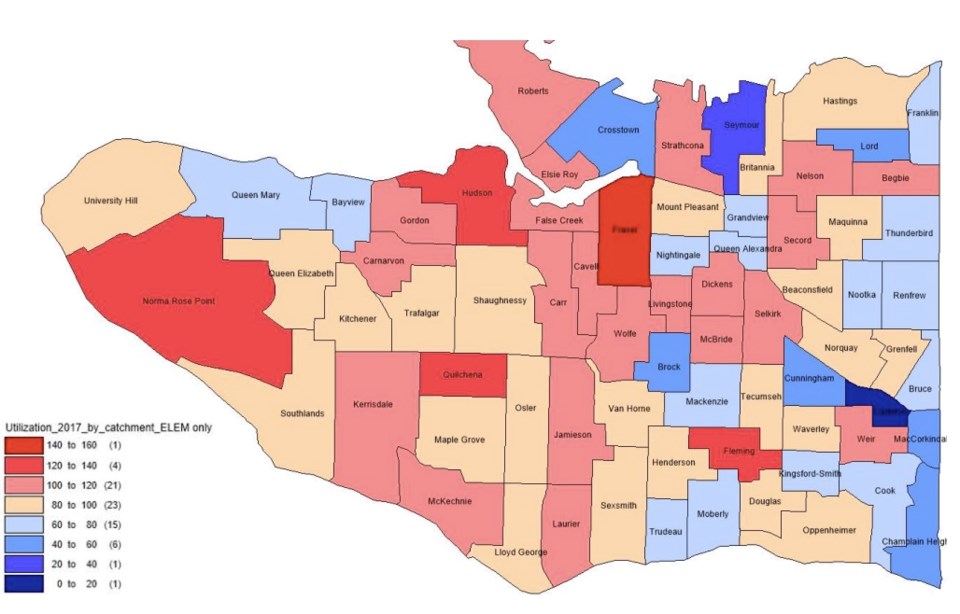Way back in 2016 — before the entire school board was fired and before an NDP government was in power — the Vancouver School Board had a plan to close 20 schools.
Twelve schools would be closed outright, and other eight would be repurposed into “swing space” that would be closed to local kids, but open for kids from other schools that were being seismically upgraded.
Vancouver’s got a major space problem in its schools — overall, they are just 85.7 per cent full, with utilization ranging from 18 per cent at some schools to 159 per cent at others, a VSB memo states. Schools on the city’s East Side, in single family home neighbourhoods, tend to be emptier than those on the West Side. In fact, of the 12 schools on the chopping block in 2016, 11 were on the East Side.
In total, there were 8,600 surplus seats in the district, the memo says. That’s the equivalent of about 24 elementary schools or six or seven high schools.
At the same time, schools in certain areas, such as downtown or in False Creek, are overflowing with kids.
Schools aren’t in good shape either — there is more than $800 million in “deferred maintenance,” which represents repairs that are needed but have not been funded or completed.
There are a whopping 77 schools in Vancouver where kids would not be safe if an earthquake hit, the memo says. Sixty-two of those are high-risk, and 15 are low- to medium-risk.
How we got here is a long, complicated story, but the nuts and bolts of it are that the province pays for building and seismically upgrading schools, and they’re not keen to spend millions to replace or fix up schools that are half empty. They want Vancouver trustees to make tough decisions to close schools, a process that is fraught with parental angst and political woe. Pressure was high to do so in 2016 when the government wanted capacity up at schools and said it would no longer pay for portables while a school is being upgraded or rebuilt, especially if there is space available in other schools.
This brings us to today’s dilemma, where the need for swing space is acute, and pressure is still there, although subdued, to close or amalgamate schools.
Two weeks ago in this space, I wrote about Edith Cavell elementary, where the powers that be have made two seemingly ridiculous recommendations — first that the student body be bussed 10 kilometres across town for two years and second that a nearly 100-year-old school receive seismic upgrades when a replacement school would actually save millions of dollars in the long run.
A solution to the first problem may have been found. Students might be able to go to school in some empty classrooms at Magee secondary, where there are also some unused portables. Sounds reasonable, right? Certainly, it’s a shorter commute.
But here’s the thing — Magee sits on the same grounds as Maple Grove elementary, which is slated to be rebuilt any minute now. Construction could begin in January, says mom Monica Tang, who is a member of the Parent Advisory Committees at both Maple Grove elementary and Magee secondary schools.
Fortunately for the Maple Grove students, there is enough room there to build a new school beside the old school, so students won’t have to move during construction. Maple Grove, like Cavell, is already over capacity, so space for things like outdoor play, libraries and gym time will be at a premium, especially once construction gets underway.
An emergency meeting last week was jam packed with parents and neighbours, but Tang said there wasn’t a lot of information shared. Concerns were raised about the lack of consultation, safety for the kids and traffic problems in the area that will exacerbated with another 300 kids getting dropped off.
“We understand that this needs doing. We empathize greatly with other schools, including Cavell, that are going through the same process,” Tang said. “We are just asking for clarity and transparency in the process and information sharing.”
Patricia MacNeil, VSB’s director of communications, said the district is talking to parents at all three schools and will consider the information as part of its final decision, expected in December.
“At that time, parents will be provided with details,” MacNeil said. “It is our priority to ensure students attend seismically safe schools as quickly as possible while at the same time providing educationally appropriate swing sites during construction.”
With a new board and an urgent need to update that shelved 2016 plan, VSB is working on a new plan to be made public in January. Its priorities will include reducing excess capacity and balancing enrolment demand with available space, as well as making sure all schools will be safe in an earthquake.
It won't be a surprise if school closures make a reappearance in that new plan.
Tracy Sherlock writes about education and social issues. She can be reached at [email protected].



